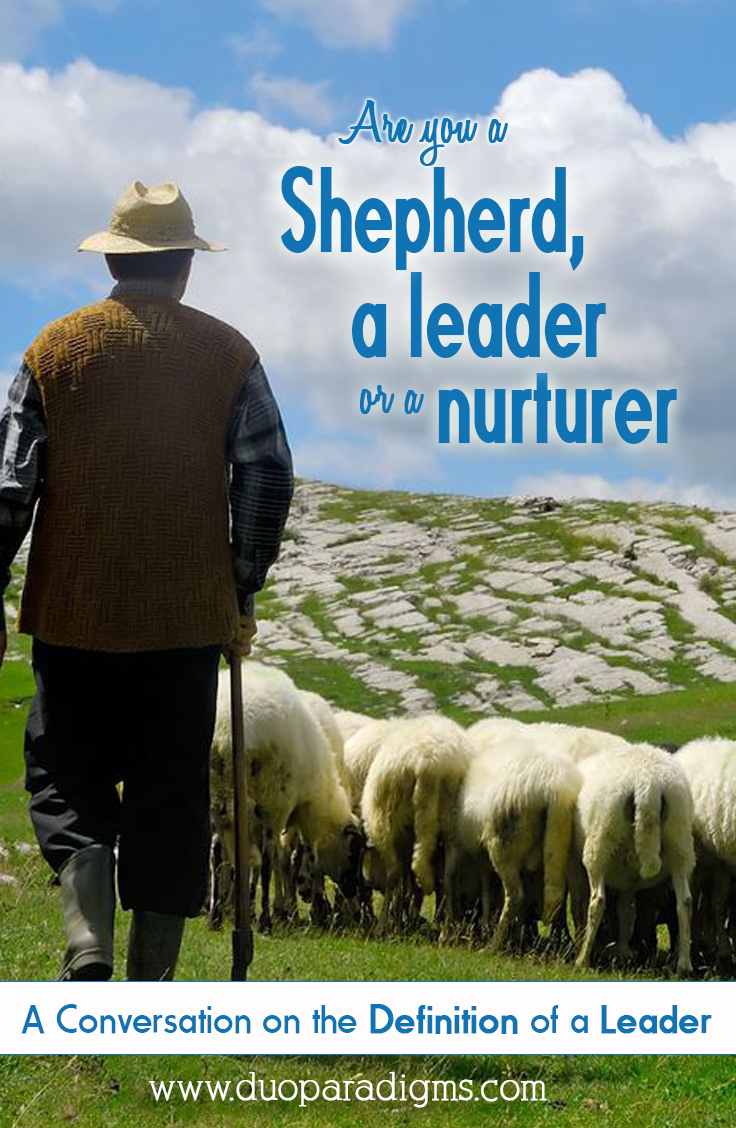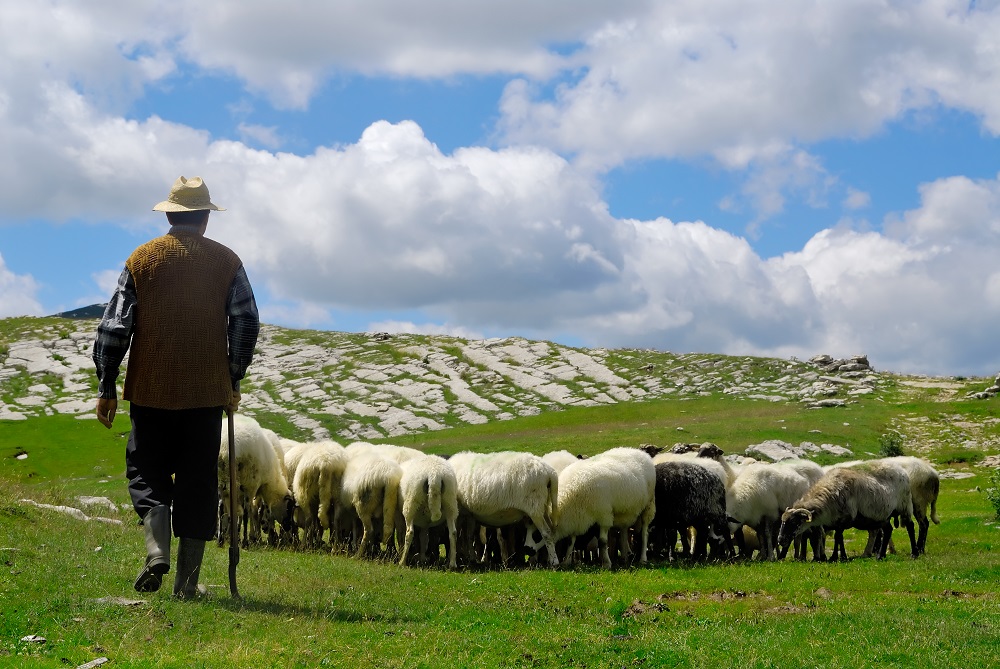Leader.
It’s a word that we toss around frequently, but what does it really mean? Is someone born a leader or does a person develop into a leader? Is there a difference between being a leader, a nurturer, or a shepherd?

Over the summer, I exchanged several emails with my friend and former tennis colleague Paula Vergara. Paula is an accomplished freelance editor and writer, who has contributed to many prominent publications including The Boston Globe, USA Today, and Tennis.com. I had the joy of working regularly with her when I owned On the Baseline Tennis News and for at least seven years, I’ve enjoyed many thought-provoking discussions on not just tennis, but many other topics.
A few months ago, Paula posed an intriguing question to me about shepherds and shepherd leaders. It quickly grew into a very fascinating discussion, and one that I thought our blog readers might enjoy as well. With Paula’s permission, I hope that you will enjoy part one of our email discussion. I’ll follow-up with part two soon.
Paula’s comments are in italics, whereas mine are in standard font.
Aaress,
I recently got into a discussion with my sister about shepherds. My idea was that we are a family of shepherds, in terms of the way we live our lives, as well as the jobs we have all chosen. She somehow interpreted that as “leaders”, and I disagreed. In business, how would you distinguish between a shepherd and a leader?
Paula
———————
Ohhh, now this is a fascinating discussion! Before I answer, can you expound a bit on how you envision a “family of shepherds”? Do sheep have a role to play in the picture?
Aaress
———————
Great question. When it comes to a “family of shepherds”, I was thinking that this could be a more of a genetic type of thing. In my case, this goes back to my grandmothers. They were incredibly strong people, who managed to keep their family together, even during the most difficult times, and produced the next generation of shepherds. Even the dog that recently came into our family is very protective, and has shepherd-like qualities.
There is some gray area between a leader and a shepherd. Leadership, in my opinion, is one of the qualities of a good shepherd, but being a leader isn’t really what it’s about. A shepherd is more of a care-giver/role model. The sheep are those who simply need help/guidance. In life, this could be a friend, non-blood relative, or simply a person on the street, or animal that needs help. That’s not to say that a shepherd never needs help, or that ALL family members are shepherds, just because they are related. It’s just that certain people seem to have more shepherd-like traits than others, and it seems as though it could be genetic.
When it comes to business, I don’t know how to distinguish between a leader and a shepherd, other than to say that you can’t be a good leader unless you understand how to be a good shepherd.
What do you think?
Paula
———————
Hi Paula,
Again, what a fascinating discussion! I’m glad you thought of it.
Thanks for your patience as I’ve been thinking on this and trying to get caught up this week. I actually wasn’t off on vacation, but went up to Oklahoma City for a few days to spend time with a team that is helping me with an upcoming event. Ironically, the group, In the Gap is committed to raising up the next generation of leaders with integrity and character.
So that brings me to the Shepherd vs. Leader discussion. I’m actually more closely aligned in thought with your sister, as I didn’t think of the concept of a “family of shepherds”. What you describe below, I tend to think of as a Nurturer. To me, a Nurturer is someone who has the role and responsibility of mentoring, nurturing, and caring for the well being and growth of a family or organization.
A Shepherd is a little different for me. A Shepherd contains many traits of both a Nurturer and a Leader. But some of the differences between a Shepherd and Nurturer to me is responsibility and oversight. I think of the head of a household or organization as a Shepherd figure—the quintessential “buck-stops-here” personification. You can have a family of Nurturers of older siblings, aunts, uncles, grandparents, employees, etc, but ultimately there is just one Shepherd in a group.
You’ll find the Bible full of references to shepherds and their flocks. I actually have been reading through the book of Isaiah over the past month or so, and I read Isaiah 53:6 just this morning about the importance of why everyone needs the Good Shepherd (the Lord Jesus) to bear our burdens and sins. “All we like sheep have gone astray; we have turned every one to his own way; and the Lord hath laid on him the iniquity of us all.” Isaiah 53:6
We have a perfect example of a Shepherd in the life of Christ and a leader can do no better than to follow in His footsteps. The word Shepherd is mentioned 74 times in the Bible, so it’s very apparent that this is a concept near and dear to the heart of God. One of the most beloved pieces of literature of all time, Psalm 23, portrays us as sheep and God as our loving, caring, protecting Shepherd.
This thread continues in the New Testament as we see many references to the role of a Shepherd.
Here’s a few of my favorites:
“Now the God of peace, that brought again from the dead our Lord Jesus, that great shepherd of the sheep, through the blood of the everlasting covenant, Make you perfect in every good work to do his will, working in you that which is wellpleasing in his sight, through Jesus Christ; to whom be glory for ever and ever. Amen.” Hebrews 13:20-21
“I am the good shepherd: the good shepherd giveth his life for the sheep.” John 10:11
Another thing I love about the concept of a Shepherd—and we see this all throughout the Bible, other literature, and first-hand accounts of shepherding—is that the watch-care, nurturing, correction, and protection is all motivated by one thing.
Genuine love.
A shepherd doesn’t just protect his flock because he has the job of doing it. He protects his flock because he loves them and cares for them, and would often put his life on the line to protect them from bears, lions, rustlers, and other dangers.
Jesus tells a story about this in John about the difference between a shepherd and just a “hireling”—someone just hired to keep an eye on the sheep without an affinity or oneness with the herd. In times of danger, the hireling would often just take off, because after all, they weren’t HIS sheep. In his eyes, it was someone else’s problem when the going got tough.
I think you’ll see a parallel there with what can happen in an organization or even a family, if there’s no Shepherd taking responsibility for the care of the sheep.
I’m looking forward to continuing this fascinating discussion and am eager to read your thoughts. By the way, one of the best books I’ve read on the role of a Shepherd is Philip Keller’s A Shepherd Looks at Psalm 23. Keller was a shepherd, which gives him a wonderful first-hand perspective. I think you might enjoy reading it, so I just sent you a copy via Amazon. You should have it in your mailbox this weekend!
Talk more soon!
Aaress
What about you? How do you define a leader, a shepherd, or a nurturer? Leave us a comment and stay tuned for part 2!
Our newsletter will help you grow your Christian business or ministry online:
Disclosure: Some of the links on our website are “affiliate links.” This means if you click on the link and purchase an item, we will receive an affiliate commission. We only recommend products or services that we feel will add value to our followers. We are disclosing this in accordance with the Federal Trade Commission’s 16 CFR, Part 255: “Guides Concerning the Use of Endorsements and Testimonials in Advertising.”


